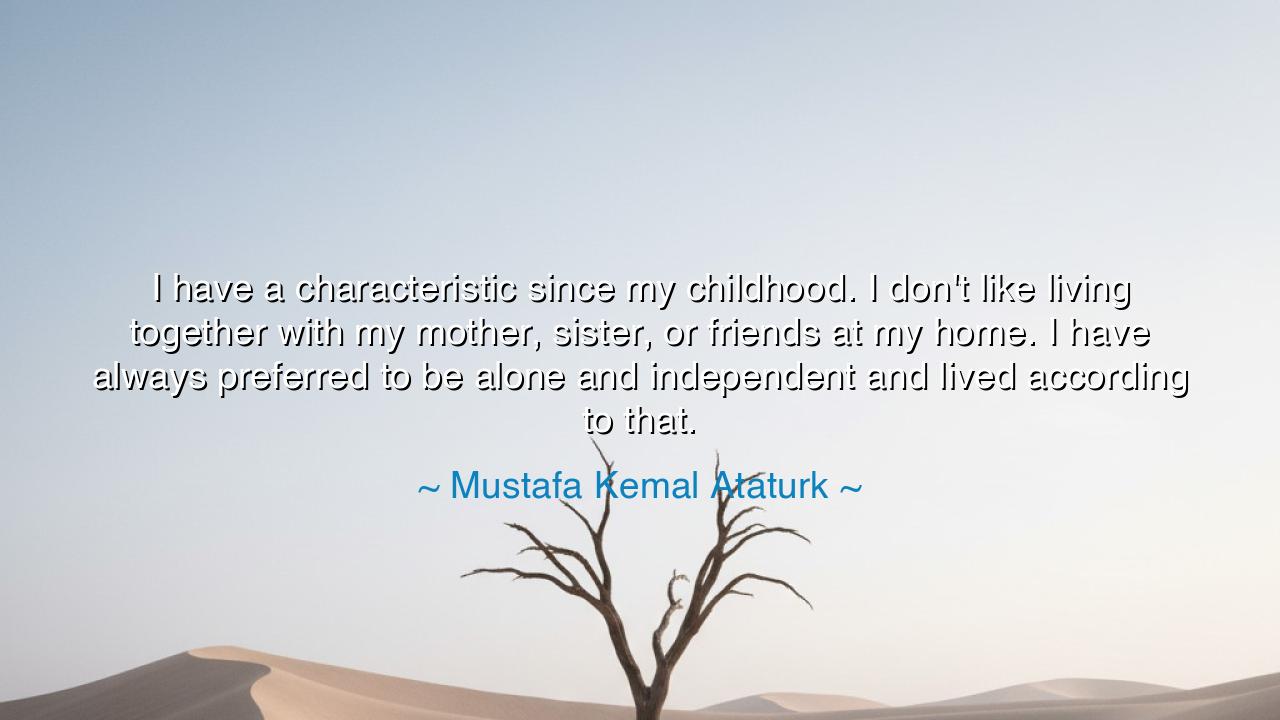
I have a characteristic since my childhood. I don't like living
I have a characteristic since my childhood. I don't like living together with my mother, sister, or friends at my home. I have always preferred to be alone and independent and lived according to that.






“I have a characteristic since my childhood. I don’t like living together with my mother, sister, or friends at my home. I have always preferred to be alone and independent and lived according to that.” — thus spoke Mustafa Kemal Atatürk, the founder of modern Turkey, the soldier-philosopher who carved a nation from the ashes of empire. In these words, he reveals not pride or coldness, but the deep spirit of solitude that often accompanies visionaries. His declaration is not a rejection of love, but an affirmation of independence, of that inner strength which grows only when one stands alone. From his youth, Atatürk understood that the path of destiny often demands distance — a space where the soul can hear its own voice above the chorus of others.
The origin of this quote lies in Atatürk’s early life — a boy born into hardship, who lost his father young and faced the trials of instability and exile. In such solitude, he discovered self-reliance. The absence of constant comfort made him self-contained, teaching him to depend not on family or friends, but on the clarity of his own mind. This independence was not arrogance but necessity — a preparation for the weight of the world he would later carry. For how could a man lead millions if he had not first mastered himself? How could he forge a new nation if his will were bound by dependence or hesitation?
Atatürk’s words echo the ancient truth that solitude is the crucible of greatness. The prophet, the philosopher, the warrior — all have walked alone before they could guide others. Solitude refines the will like fire tempers steel; it burns away weakness and fear, leaving behind only purpose. The one who dares to be alone learns to command not others first, but himself. Atatürk’s lifelong discipline, his capacity to make hard choices without flinching, his ability to hold steady amid chaos — these were the fruits of a mind trained in solitude. The independence he cherished was not isolation from humanity, but freedom from dependence — the freedom to act with clarity when others faltered.
Consider the story of Alexander the Great, who, though surrounded by armies and courtiers, lived as one apart. In the stillness of his tent, he studied maps, philosophy, and the writings of Homer, shaping his destiny in the silence of thought. Like Atatürk, Alexander knew that leadership demands a mind unclouded by constant companionship. Both men loved their people fiercely, yet stood apart from them, not out of disdain but out of duty. For those who carry the future on their shoulders must sometimes step beyond the warmth of the hearth to face the storm alone.
Atatürk’s independence, however, was not selfish solitude. It was creative isolation — the space in which new ideas are born. When the Ottoman Empire crumbled, others mourned its fall; Atatürk envisioned a republic. While others clung to tradition, he dreamed of education, science, and equality. His solitude became the womb of innovation — his silence, the forge of reform. For solitude, rightly embraced, is not emptiness but a sanctuary for vision. It is the place where the mind ceases to echo the world’s noise and begins to speak with its own voice.
Yet in these words, there is also a trace of melancholy — the cost of such independence. To live according to one’s own law is to dwell often in loneliness. The path of the solitary is not without sacrifice: the warmth of family dinners, the ease of shared burdens, the comfort of being understood. But Atatürk’s life teaches us that loneliness is not always sorrow; it can be the price of freedom. For the one who stands alone may also stand tallest — not because he rejects others, but because he refuses to let their expectations confine his destiny.
The lesson, then, is both noble and demanding: if you would become truly yourself, you must sometimes walk alone. Do not fear solitude — it is the workshop of strength. Cultivate independence not as rebellion, but as mastery over the self. Let your solitude refine you, not isolate you; use it to think deeply, to act with purpose, to serve others with clarity. The one who is never alone never truly knows who he is. But the one who has faced his own silence and made peace with it carries within him an unbreakable core.
So let the words of Mustafa Kemal Atatürk resound through time: “I have always preferred to be alone and independent.” Take them not as a rejection of love, but as a call to self-possession. For in a world that clings to comfort and conformity, the courageous soul must sometimes stand apart — to think freely, to act justly, to build anew. Solitude, when embraced with purpose, is not emptiness but power — the power to lead, to create, and to live as one’s truest self.






AAdministratorAdministrator
Welcome, honored guests. Please leave a comment, we will respond soon